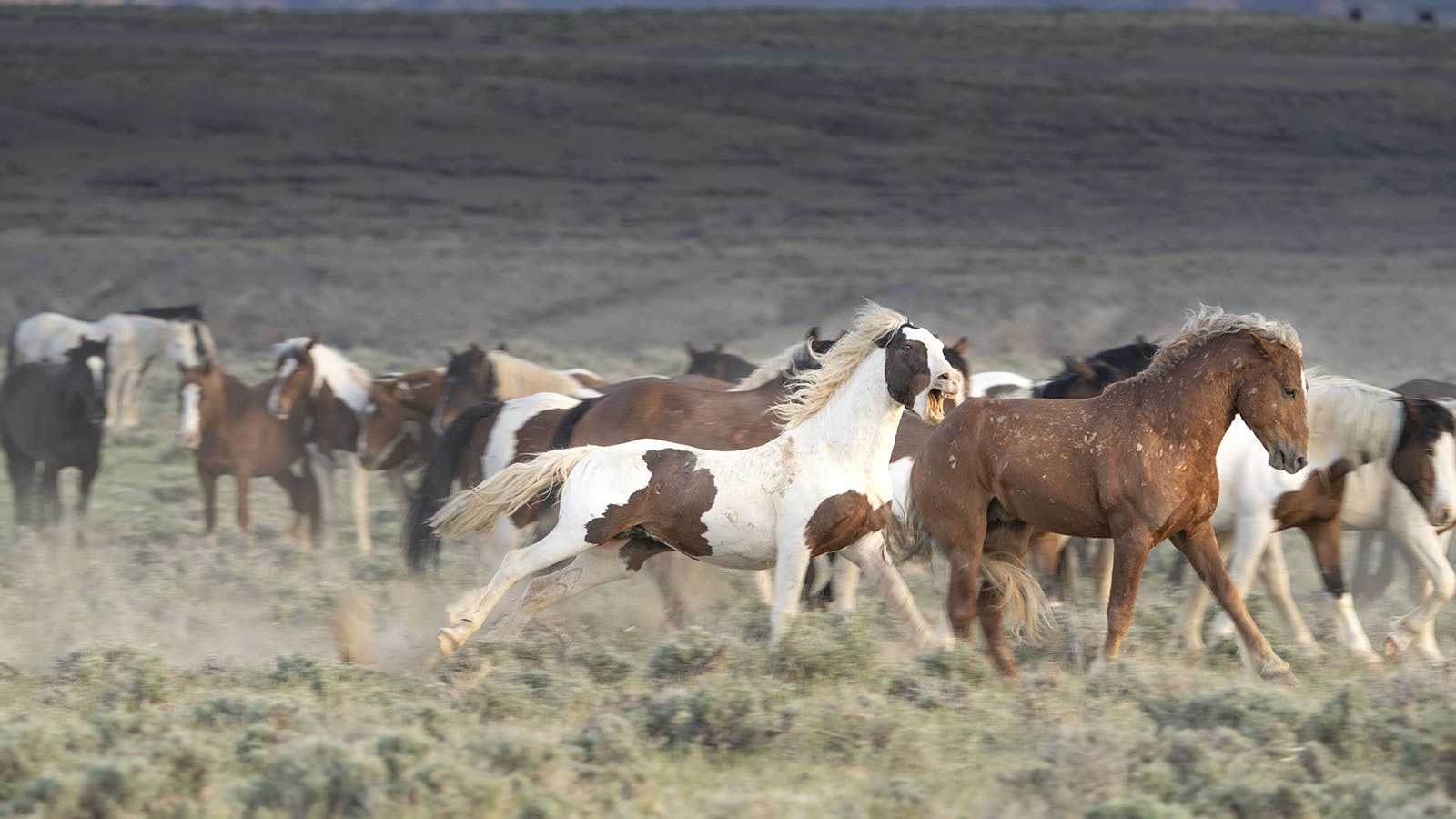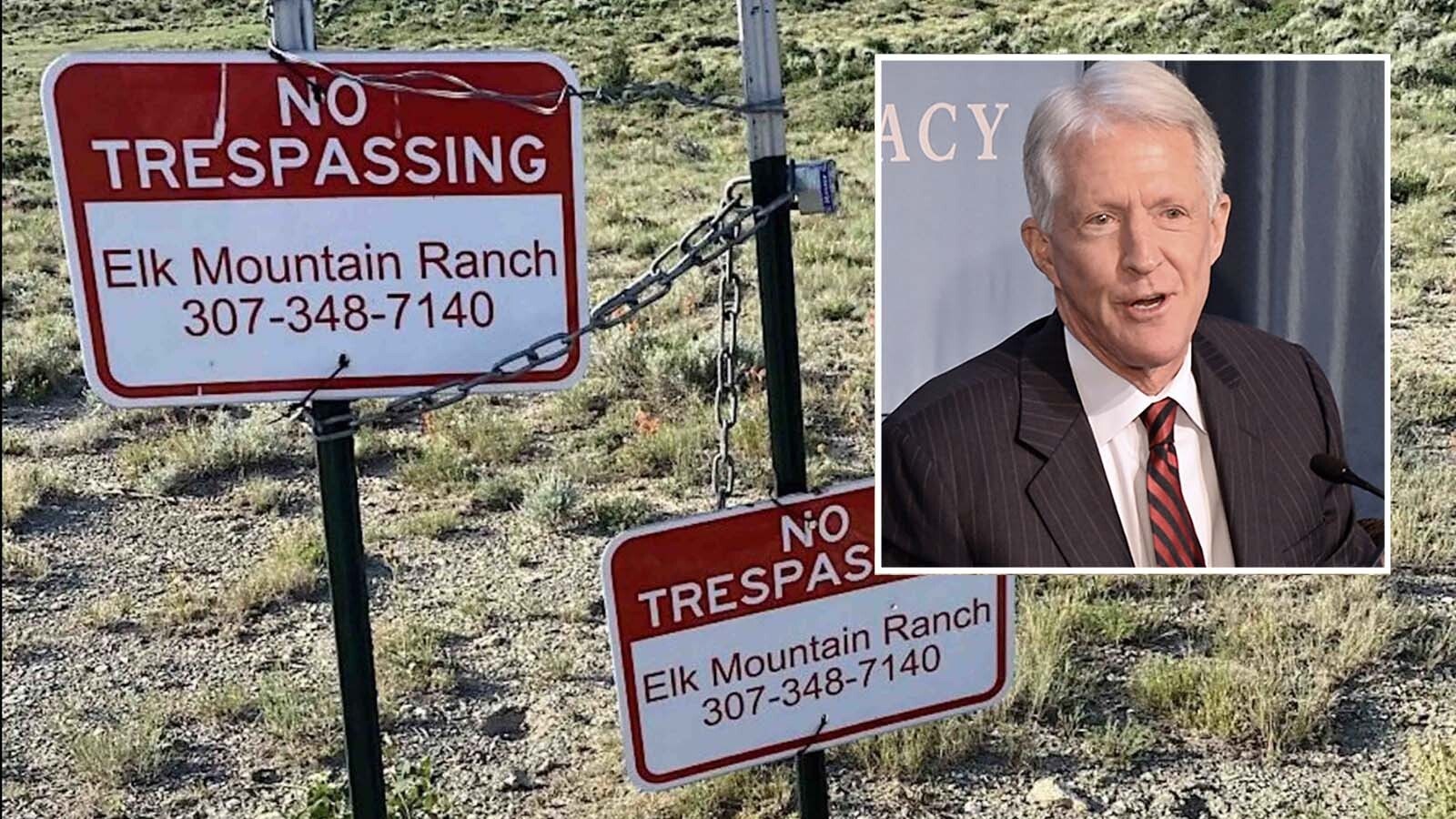Wyoming mustangs are shipped to slaughter in Mexico through shady deals with “kill buyers,” said some wild horse advocates, who applauded the U.S. Congress moving to crack down on the practice.
“Wyoming is home to the second largest number of wild horse herd areas outside of Nevada. We can reasonably assume that mustangs gathered here have been adopted, sold, and sent to slaughter in Mexico,” Chad Hanson of Casper told Cowboy State Daily.
He and his wife Lynn founded the Wyoming Mustang Institute, a wild horse advocacy group.
Applauding Congress’ Efforts
Hanson applauds Congressional efforts to ban horse slaughter.
“I am glad to see Congress take up a pair of bi-partisan bills aimed at strengthening and making permanent the current federal ban on horse slaughter, along with the addition of a ban on exporting horses to other nations for the same purpose,” he said.
“In the time I have spent studying and photographing the wild horses of Wyoming, I have been impressed by their intelligence, communication networks, and social organization. It is not hard to imagine why Congress took the step, more than 50 years ago, to protect the wild horses of the West. I fully support the effort to make permanent the ban on horse slaughter,” Hanson added.
Legislators Said Slaughter Is A Good Thing
Horse slaughter, particularly as a method of controlling mustang numbers, has its supporters in Wyoming.
During the Wyoming Legislature’s session earlier this year, some lawmakers supported a resolution calling on Congress to re-open U.S. horse slaughter plants, which haven’t operated since 2007.
“The next thing that’s really hampering this whole effort (toward mustang management) is the fact that these horses cannot be slaughtered for meat,” Rep. John Winter, R-Thermopolis, said at the time. “We used to have a slaughter plant in North Platte, Nebraska, and it worked very well.”
On Wednesday, Winter told Cowboy State Daily that he still favors horse slaughter. He’s reached out to Wyoming’s Congressional delegation regarding the anti-horse slaughter bills, but hadn’t yet gotten a response.
Winter said that people who oppose horse slaughter might have concerns about animal welfare. However, he thinks that shutting slaughterhouses down has actually made things worse for both mustangs and domestic horses.
“The horse slaughter plants in Canada shut down, so right now, horses can only go to Mexico. And they have to stay in quarantine on our side of the border for 30 days before they can even go into Mexico,” he said.
“There’s no place for people to take their horses when they get old and decrepit. So, people just set them lose on BLM land or the Wind River Indian Reservation, and then they become a problem for somebody else,” he said.
“If you look out on the range sometimes there’s horses out there that are just skin and bones because they don’t have anything to eat,” Winter added. “The people who are promoting this (the anti-slaughter bills) don’t have a clue about what’s really going on.”
Congress Moves To Stop ‘Kill Buyers’
Two recently-introduced bills, one before the U.S. House and the other before the U.S. Senate, aim to crack down on kill buyers shipping horses to foreign slaughter plants, and permanently ban horse slaughter in the U.S.
Senators Robert Menendez, D-New Jersey and Lindsey Graham, R-South Carolina introduced the Senate bill. Representatives Vern Buchanan, R-Florida and Jan Schakowsky, D-Illinois, introduced the House bill.
Kill buyers purchase domestic horses that have gotten too old for things such as racing or police service, and then sell them at a profit to slaughterhouses in Mexico, according to animal rights groups that support the Congressional bills.
Similar shady deals are made with captured Wyoming mustangs that are supposed to be adopted to good homes, said Hanson and wild horse advocate Angelique Rea of Thermopolis.
“I know there are ongoing efforts by multiple organizations including Return to Freedom, I work with RTF on various things, to ban horse slaughter in the United States, something I fully support, along with a stop on shipping any horses across borders to slaughter,” Rea said.
Did BLM Incentive Increase Slaughter?
Mustangs in Wyoming and across the West are managed by the Bureau of Land Management, under the federal 1971 Wild Horse and Burro Act. The BLM sometimes rounds up mustangs off the range and places them in holding facilities – where some are offered for adoption.
In 2019, the BLM started offering a $1,000 per horse incentive, in hopes of encouraging adoptions.
That might have backfired, and made kill buyer networks more active, Rea and Hanson said.
Hanson said the New York Times documented how the incentive payments caused an uptick in mustangs being sent to slaughter.
Rea said she’s also heard of similar problems.
“As to mustangs (being sent to slaughter), yes, it is something that is happening, and has increased with the AIP (Adoption Incentive Program) that the BLM implemented in an attempt to increase adoptions,” Rea said. “It’s a well-intentioned program that needed more oversight.”
BLM Says Adoptions Are Monitored
In Wyoming, the BLM is carefully monitoring adoptions to keep horses out of kill buyers’ hands, agency spokesman James Fisher told Cowboy State Daily.
“The BLM never intentionally adopts horses out to people who intend to slaughter them, in fact, we require each person interested in adopting to sign a letter stating they are not going to do this,” he said.
“Before adopting we ensure the people have the sufficient space and enclosures to care for them appropriately. We provide onsite wellness and care checkups throughout the first year of ownership of the horse, if we detect mistreatment or neglect of any kind, we’ll take the horse back,” Fisher added.
People officially own their adopted mustangs after a year, he said. But even then, the BLM frowns on shipping horses to slaughter.
“After the year, the person will receive title to the horse, thus becoming the official owner. At this point, the horse becomes their private property,” Fisher said. “If the individual ends up sending their horse to slaughter after all, they will be barred from ever adopting again in the future. We want these horses to go to good homes.”
He also added that as a relative newcomer to the BLM, he recently toured some mustang holding facilities, and was impressed by how well taken care of the horses there were.
What About Birth Control?
Just how many mustangs are in Wyoming has been a matter of dispute. The BLM recently estimated their numbers to be roughly 8,100 here. But Hanson disputed that, and Fisher said the BLM is double-checking its numbers as a result.
How to manage the mustang’s numbers over the long term has been a matter of contention.
Some, like Winter, have continued to call for slaughter. Others have said that darting mares with birth control drugs is the best option. Winter and other detractors said that won’t work until mustang herds have already been culled to more manageable numbers.
Hanson said he still stands by birth control as the best method.
“At the Wyoming Mustang Institute, we advocate for the use of the fertility control drug PZP in the management of wild horses,” he said. “PZP is a time-tested, humane, and affordable means to stabilize and maintain ungulate populations. The Wyoming BLM has successfully pioneered the use of PZP with wild horses in the field, most famously in the McCullough Peaks herd east of Cody.”
Mark Heinz can be reached at mark@cowboystatedaily.com.





